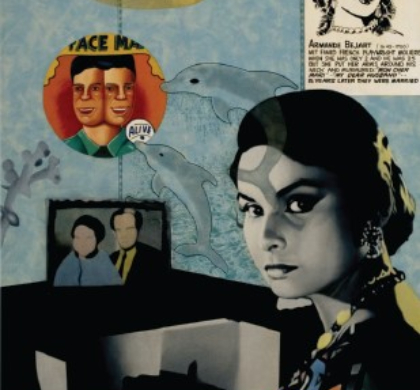
Note 47
At the core of the stories in Out of Print 47 is the sense that the main characters in each of the pieces are out of sync with how those around them perceive a situation, and how the rest of society views the world. This shift in reality impacts the way the characters negotiate their everyday interactions with other people, affects what they expect, and what the world expects of them.
Two stories about friends of many years appear in this edition.
In Shaheen Akhtar’s ‘The Story of a Moonlit Night’, translated from Bangla by Arifa Ghani Rahman, the protagonist, a writer, is visited by a dear friend after many years, a friend who sees things differently, a friend who hears other people’s thoughts, a friend, we learn, who suffers from schizophrenia. And as they share their perceptions of their lives, they step out of their cloistered space and walk through the seething bazaar, and the reader’s sense of what is real shifts too.
Waking up, and loathe to get out of bed on a freezing cold morning, our character is faced with having to confront his guest about his choices. They are old friends who know each other well, their conversation based on a long and affectionate and often critical knowledge of each other proceeds in a predictable way, both challenging and caring, until the matter that preoccupies our character comes to the fore. The motivations that drive daily existence suddenly seem less and more important in ‘Life in the Big City’ by Ravindra Kalia, translated from Hindi by Vaibhav Sharma.
The following two stories are about characters who deal with change and transition.
At the same time that its protagonist, Shams, moves its trajectory pragmatically forward, a sense of nostalgia, of looking back, pervades ‘In the Shadow of the Haveli’ excerpted from Tariq Chhatari’s novel in progress, Asmaan Manzil and translated by Fatima Rizvi. The story of the old haveli, the seat of family and tradition, now broken apart, and the new house, built with enthusiasm by Shams intersect in the narrative. And at the heart of the tension caused by this is Sham’s elderly aunt, Sakina Begum with her memories of the space left behind.
Rebecca Matthai’s ‘And What is Kept’ offers an intimate portrait of a woman as she comes to terms with the slow unravelling of her marriage, and a move across continents. Faced with an unexpected solitude, she takes to slaking her heart with things she finds beautiful – boots, wool suits, and several expensive haircuts. In this piece of lyrical honesty, Matthai reveals how so much of who we are is intertwined with what we keep.
The issue also features two stories narrated from the point of view of a child.
The protagonist of Ankush Banerjee’s ‘Rough Edges’ is Gullu – a young, observant boy whose life is changed unceremoniously and without warning in the stroke of a harrowing afternoon. What follows is a visceral story of a loss of innocence as the child attempts to move forward from a traumatic event, and the implicit violence surrounding the process. As he grapples with his emotions, what emerge are his loneliness, his distance from his parents, and his unvoiced need for connection.
In Tripurari Sharma’s ‘His Father’s House’, an apparently simple visit becomes an event of reverence in the eyes of the young protagonist Radhu. Sharma illuminates mundane activities like eating a home-cooked meal, and a father and son playing catch in a tender portrayal of complex family dynamics. Quotidien pleasures form the crux of this layered story told through the eyes of a wonderstruck child seeking his father’s attention.
Our lives are composed, to our innate terror, around our inevitable mortal ends. But what is left of those left behind? Bhargava Gade’s ‘Amma’ is a sharp observation on the nuances of grief – of an older son meandering through tensions surrounding religion, family and illness after the death of his mother. Written in parts with anger, and in parts with irreverence, Gade’s speaker eventually finds ways to become accustomed to an expected loss.
The art on the cover of Out of Print 47 is by Atul Dodiya.
